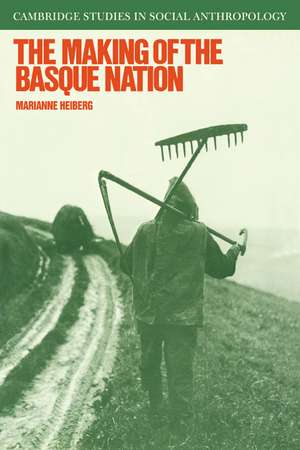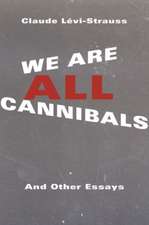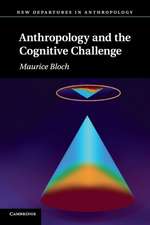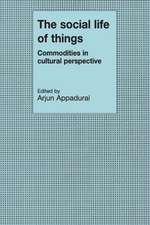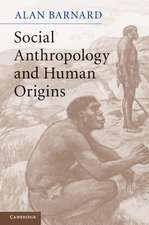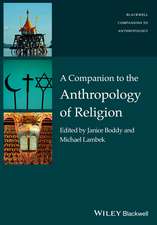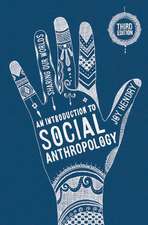The Making of the Basque Nation: Cambridge Studies in Social and Cultural Anthropology, cartea 66
Autor Marianne Heibergen Limba Engleză Paperback – 16 sep 2007
Din seria Cambridge Studies in Social and Cultural Anthropology
-
 Preț: 245.24 lei
Preț: 245.24 lei -
 Preț: 195.76 lei
Preț: 195.76 lei -
 Preț: 177.96 lei
Preț: 177.96 lei -
 Preț: 283.25 lei
Preț: 283.25 lei -
 Preț: 284.39 lei
Preț: 284.39 lei -
 Preț: 358.13 lei
Preț: 358.13 lei -
 Preț: 282.87 lei
Preț: 282.87 lei -
 Preț: 399.21 lei
Preț: 399.21 lei -
 Preț: 397.08 lei
Preț: 397.08 lei -
 Preț: 347.28 lei
Preț: 347.28 lei -
 Preț: 295.95 lei
Preț: 295.95 lei -
 Preț: 307.62 lei
Preț: 307.62 lei -
 Preț: 280.15 lei
Preț: 280.15 lei -
 Preț: 372.80 lei
Preț: 372.80 lei -
 Preț: 411.24 lei
Preț: 411.24 lei -
 Preț: 326.27 lei
Preț: 326.27 lei -
 Preț: 281.30 lei
Preț: 281.30 lei -
 Preț: 323.81 lei
Preț: 323.81 lei -
 Preț: 278.62 lei
Preț: 278.62 lei -
 Preț: 353.63 lei
Preț: 353.63 lei -
 Preț: 174.55 lei
Preț: 174.55 lei -
 Preț: 406.71 lei
Preț: 406.71 lei -
 Preț: 326.27 lei
Preț: 326.27 lei -
 Preț: 282.26 lei
Preț: 282.26 lei -
 Preț: 436.68 lei
Preț: 436.68 lei -
 Preț: 327.22 lei
Preț: 327.22 lei -
 Preț: 414.46 lei
Preț: 414.46 lei -
 Preț: 284.78 lei
Preț: 284.78 lei -
 Preț: 289.78 lei
Preț: 289.78 lei -
 Preț: 284.17 lei
Preț: 284.17 lei -
 Preț: 283.03 lei
Preț: 283.03 lei -
 Preț: 279.00 lei
Preț: 279.00 lei -
 Preț: 398.16 lei
Preț: 398.16 lei -
 Preț: 340.24 lei
Preț: 340.24 lei -
 Preț: 277.65 lei
Preț: 277.65 lei -
 Preț: 461.13 lei
Preț: 461.13 lei -
 Preț: 390.90 lei
Preț: 390.90 lei -
 Preț: 284.78 lei
Preț: 284.78 lei -
 Preț: 347.50 lei
Preț: 347.50 lei -
 Preț: 281.49 lei
Preț: 281.49 lei -
 Preț: 278.24 lei
Preț: 278.24 lei
Preț: 392.94 lei
Nou
Puncte Express: 589
Preț estimativ în valută:
75.19€ • 78.70$ • 62.58£
75.19€ • 78.70$ • 62.58£
Carte tipărită la comandă
Livrare economică 31 martie-14 aprilie
Preluare comenzi: 021 569.72.76
Specificații
ISBN-13: 9780521040280
ISBN-10: 0521040280
Pagini: 284
Dimensiuni: 153 x 229 x 16 mm
Greutate: 0.42 kg
Editura: Cambridge University Press
Colecția Cambridge University Press
Seria Cambridge Studies in Social and Cultural Anthropology
Locul publicării:Cambridge, United Kingdom
ISBN-10: 0521040280
Pagini: 284
Dimensiuni: 153 x 229 x 16 mm
Greutate: 0.42 kg
Editura: Cambridge University Press
Colecția Cambridge University Press
Seria Cambridge Studies in Social and Cultural Anthropology
Locul publicării:Cambridge, United Kingdom
Cuprins
List of maps; Preface; Introduction: empire and the emergence of Spain; Part I. From plurality to Basque ethnic solidarity; 1. The Basques in history; 2. The foundations of the modern Basque country; 3. History as myth; 4. From the illuminated few to the Basque moral community; 5. The moral community and its enemies; 6. 'España, una, libre y grande'; 7. The moral community, from clandestinity to power; Part II. Inside the Moral Community: the Village of Elgeta, Guipúzcoa: Introduction; 8. Social organization in Elgeta; 9. Morality manifested: village politics, 1872–1936; 10. Hierarchy reimposed; 11. Hierarchy dismantled; Postscript; Conclusion: ethnic nationalists and patron-clients in southern Europe; Notes; Bibliography; Index.
Descriere
Set against the historical background of Spain's unification as a modern state, this book is a study of Basque nationalism.
